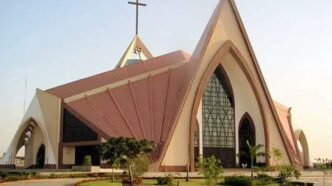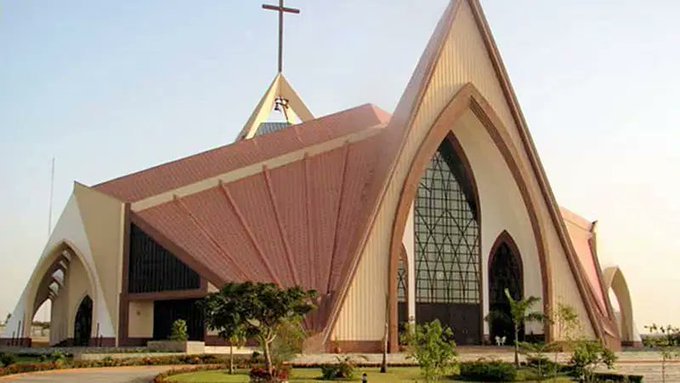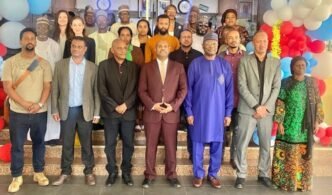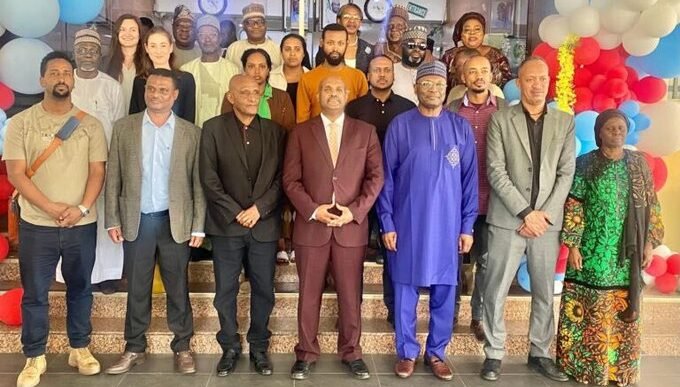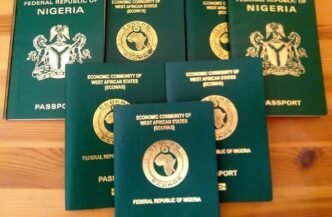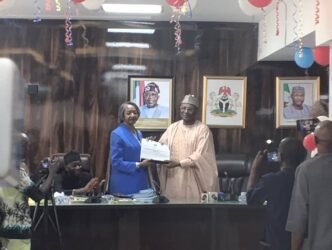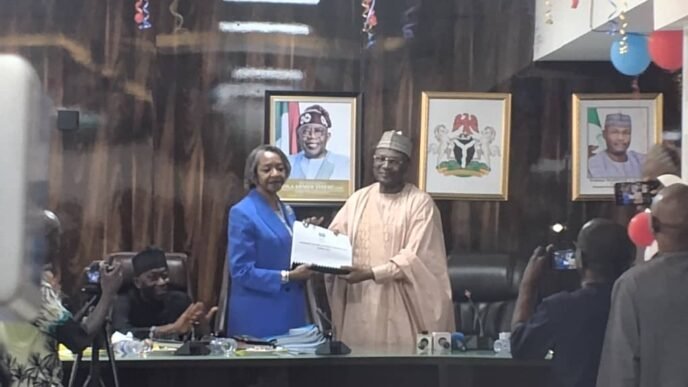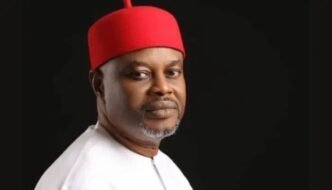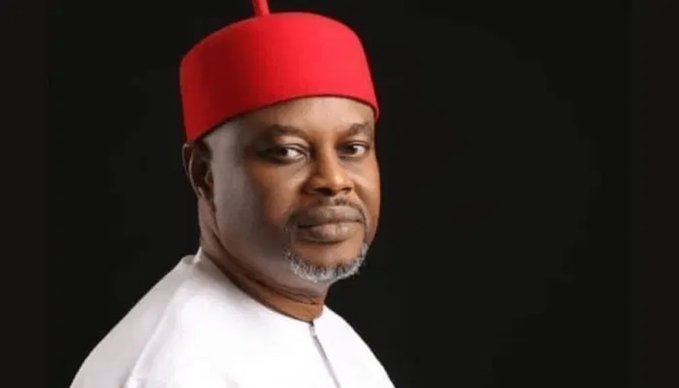The Church of Nigeria (Anglican Communion) has declared full spiritual independence from the Church of England, following the appointment of Bishop Sarah Mullally as the new Archbishop of Canterbury — the first woman and openly affirming leader of same-sex marriage to hold the position.
In a bold statement released in Abuja on Tuesday, the leadership of the Nigerian Anglican Church described Mullally’s elevation as “the final confirmation of moral decay within the leadership of the Church of England.” The statement, signed by Archbishop Henry Ndukuba, the Primate of the Church of Nigeria, announced that the church would no longer recognize the authority of Canterbury in doctrinal or spiritual matters.
“The Church of Nigeria hereby declares spiritual independence from the Church of England. We can no longer walk together with a body that has chosen to bless sin and reject the clear teaching of Scripture,” the statement read.
The Breaking Point: Appointment of Sarah Mullally
Bishop Sarah Mullally, formerly the Bishop of London, was confirmed as Archbishop of Canterbury last week, succeeding Most Rev. Justin Welby, who retired earlier this year. Her appointment was hailed in the United Kingdom as a historic step for gender equality and inclusivity within the Anglican Communion.
However, Mullally’s vocal support for same-sex marriage and gender equality has ignited outrage among conservative provinces in Africa, Asia, and Latin America — where traditional biblical interpretations remain deeply rooted.
“Her appointment marks a tragic departure from biblical orthodoxy,” Archbishop Ndukuba said. “By elevating a bishop who celebrates same-sex unions, the Church of England has crossed a line we cannot in good conscience follow.”
The Nigerian Church’s Position
The Church of Nigeria, which counts over 18 million active members across more than 10,000 parishes, is the largest Anglican province in the world. For years, it has opposed liberal reforms within the global Communion, insisting that marriage remains a sacred union between one man and one woman.
In its declaration, the Nigerian church reaffirmed its commitment to “the authority of God’s Word and the unchanging gospel of Christ,” emphasizing that it will continue to uphold biblical marriage, resist theological compromise, and operate independently of Western ecclesiastical structures.
“We remain Anglicans — but not under Canterbury,” the statement said. “Our loyalty is to Christ and the truth of His Word, not to institutions that have abandoned it.”
What Spiritual Independence Means
By declaring “spiritual independence,” the Church of Nigeria is not merely expressing disapproval but formally severing spiritual and doctrinal ties with the Church of England. This means it will no longer seek recognition or approval from the Archbishop of Canterbury in matters of faith, ordination, or international representation.
The Nigerian church will maintain communion only with provinces that share its theological convictions — primarily through the Global South Fellowship of Anglican Churches (GSFA) and the Global Anglican Future Conference (GAFCON), both of which have positioned themselves as the guardians of traditional Anglicanism.
This decision also gives the Church of Nigeria greater autonomy in its mission, allowing it to ordain bishops, form partnerships, and host international Anglican gatherings independently.
Historical Background: A Growing Rift Since 2003
The tensions between the Church of England and African Anglican provinces have been simmering for over two decades. The first major rupture occurred in 2003, when the Episcopal Church in the United States consecrated Gene Robinson, an openly gay man, as bishop of New Hampshire.
That event triggered a global backlash, especially from African churches, who accused Western Anglican leaders of abandoning biblical truth. The Church of Nigeria, alongside Uganda, Kenya, and Rwanda, led calls for a new orthodox movement within Anglicanism.
In 2008, these provinces established GAFCON in Jerusalem as an alternative global platform for conservative Anglicans. Since then, divisions have widened, with repeated boycotts of Lambeth Conferences and increasing calls for structural realignment.
A Moral Stand or a Schism?
While supporters hail Nigeria’s move as a moral stand for truth, critics fear it could deepen divisions and weaken global Anglican unity. However, many theologians argue that the split had long been inevitable.
Dr. Emmanuel Ibekwe, a church historian at the University of Ibadan, said the decision reflects “a long overdue assertion of theological independence.”
“This is not merely a protest; it’s a declaration that Christianity in Africa has matured enough to define its own path,” he explained. “The moral center of Anglicanism has shifted from England to Africa.”
He added that the Church of Nigeria’s stand could inspire other provinces to follow suit, effectively realigning the Communion along doctrinal lines rather than geography.
Reactions from Other African Churches
Across Africa, the response to Nigeria’s declaration has been largely supportive. The Anglican Church of Uganda, which had already cut ties with the Church of England in 2023 after it voted to bless same-sex unions, praised Nigeria’s “courage and conviction.”
Archbishop Stephen Kaziimba Mugalu of Uganda said:
“Nigeria has taken a necessary stand. We will continue to walk together as brothers in Christ, committed to the authority of Scripture.”
Similarly, the Anglican Church of Kenya reaffirmed its solidarity with Nigeria. Archbishop Jackson Ole Sapit stated that his province “cannot remain in fellowship with those who reject biblical teaching on marriage and holiness.”
Rwanda, Tanzania, and Sudan are also expected to issue statements in support of the Nigerian position, signaling a possible realignment of the global Anglican map.
The Church of England’s Response
Meanwhile, the Church of England has responded with caution. In her first public remarks since the controversy began, Archbishop Sarah Mullally emphasized the need for dialogue and reconciliation.
“I recognize the deep pain and disagreement within the Communion,” she said. “But I believe the love of Christ compels us to build a Church where all are welcomed and valued.”
Mullally maintained that her stance on inclusivity does not compromise Scripture but seeks to reflect “the radical hospitality of Jesus.”
However, conservative leaders dismissed her message as a reinterpretation of biblical truth for cultural convenience. “The Bible does not evolve with public opinion,” Archbishop Ndukuba said in response.
Implications for Global Anglicanism
Nigeria’s break from Canterbury could have far-reaching implications for global Christianity. Analysts say the move may accelerate the fragmentation of the Anglican Communion, with new power centers emerging in Africa and Asia.
Already, GAFCON and GSFA have been exploring plans to establish a new Council of Primates, independent of Canterbury, to coordinate doctrine, mission, and global representation.
With more than 60% of Anglicans now based in Africa, the shift could effectively end England’s historical dominance over the Communion’s leadership.
Dr. Ibekwe observed:
“What we’re seeing is the decolonization of Anglicanism. The spiritual authority once centralized in England is now moving to the Global South.”
The Way Forward for Nigeria
For the Church of Nigeria, the declaration marks a defining moment in its 175-year history. It intends to strengthen mission work, invest in theological education, and expand its international partnerships with like-minded churches in the United States, Asia, and Latin America.
Archbishop Ndukuba called on members to remain united and prayerful, saying, “This is not a time for fear but for faith. We are standing for truth, and truth will stand forever.”
The Nigerian Synod is expected to convene later this year to ratify the decision formally and outline the next phase of its independent operations.
Conclusion: A New Era of Anglicanism
The Church of Nigeria’s declaration of spiritual independence is more than a reaction — it is the culmination of two decades of tension between traditional faith and modern liberalism within the Anglican world. As the global balance of Christian influence continues to shift southward, this moment may be remembered as the official birth of an African-led Anglican future.
While the Church of England celebrates a new chapter of inclusivity, Africa’s largest Anglican province has chosen conviction over conformity — signaling that, for millions of believers, fidelity to Scripture remains the ultimate authority.

